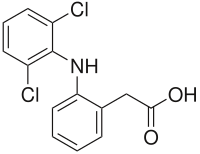
Photo from wikipedia
Chronic kidney disease is a prognostic factor for cardiovascular disease. Worsening renal function (WRF), specifically, is an important predictor of mortality in patients with acute myocardial infarction undergoing primary percutaneous… Click to show full abstract
Chronic kidney disease is a prognostic factor for cardiovascular disease. Worsening renal function (WRF), specifically, is an important predictor of mortality in patients with acute myocardial infarction undergoing primary percutaneous coronary intervention (PCI). We evaluate the prognostic impact of mid-term WRF after PCI on future cardiovascular events. We examined the renal function data of 1086 patients in the first year after PCI using the SHINANO 5-year registry. Patients were divided into two groups, mid-term WRF and non-mid-term WRF, and primary outcomes were major adverse cardiovascular events (MACE) and death. Mid-term WRF was defined as an increase in creatinine (≥ 0.3 mg/dL) in the first year after PCI. Mid-term WRF was found in 101 patients (9.3%), and compared to non-mid-term WRF, it significantly increased the incidence of MACE (p < 0.001), and all-cause death (p < 0.001), myocardial infarction (p = 0.001). Furthermore, mid-term WRF patients had higher incidence of future heart failure (p < 0.001) and new-onset atrial fibrillation (p = 0.01). Patients with both mid-term WRF and chronic kidney disease had increased MACE compared to patients with either condition alone (p < 0.001). Similarly, patients with mid-term WRF and acute kidney injury had increased MACE compared to patients with either condition alone (p < 0.001). Multivariate Cox regression analysis revealed mid-term WRF as a strong predictor of MACE (hazard ratio: 2.50, 95% confidence interval 1.57–3.98, p < 0.001). Mid-term WRF after PCI negatively affects MACE, as well as future admission due to heart failure and new-onset atrial fibrillation, chronic kidney disease, and acute kidney injury.
Journal Title: Heart and Vessels
Year Published: 2021
Link to full text (if available)
Share on Social Media: Sign Up to like & get
recommendations!